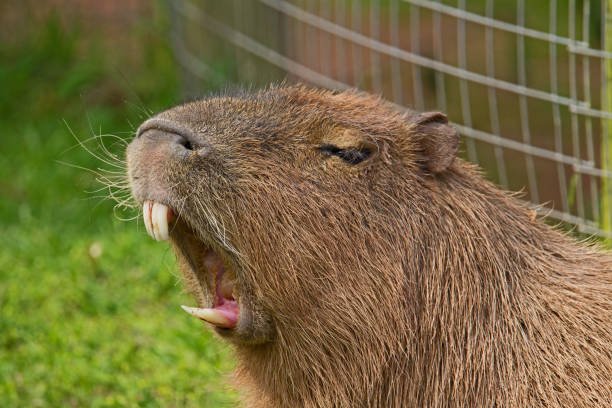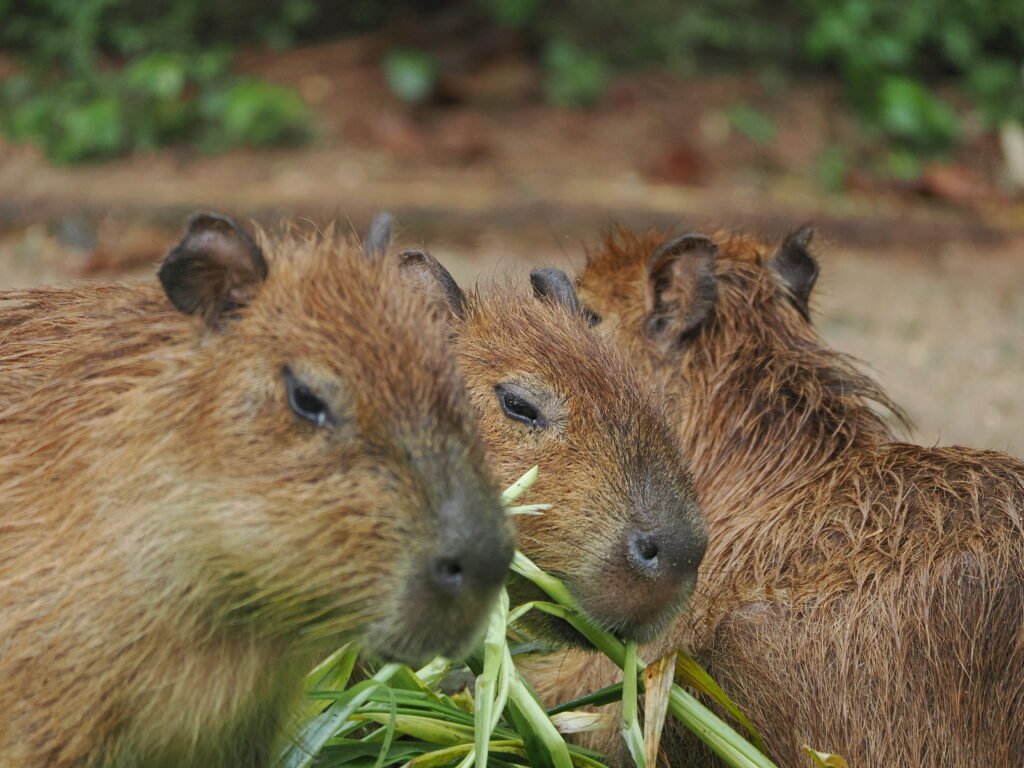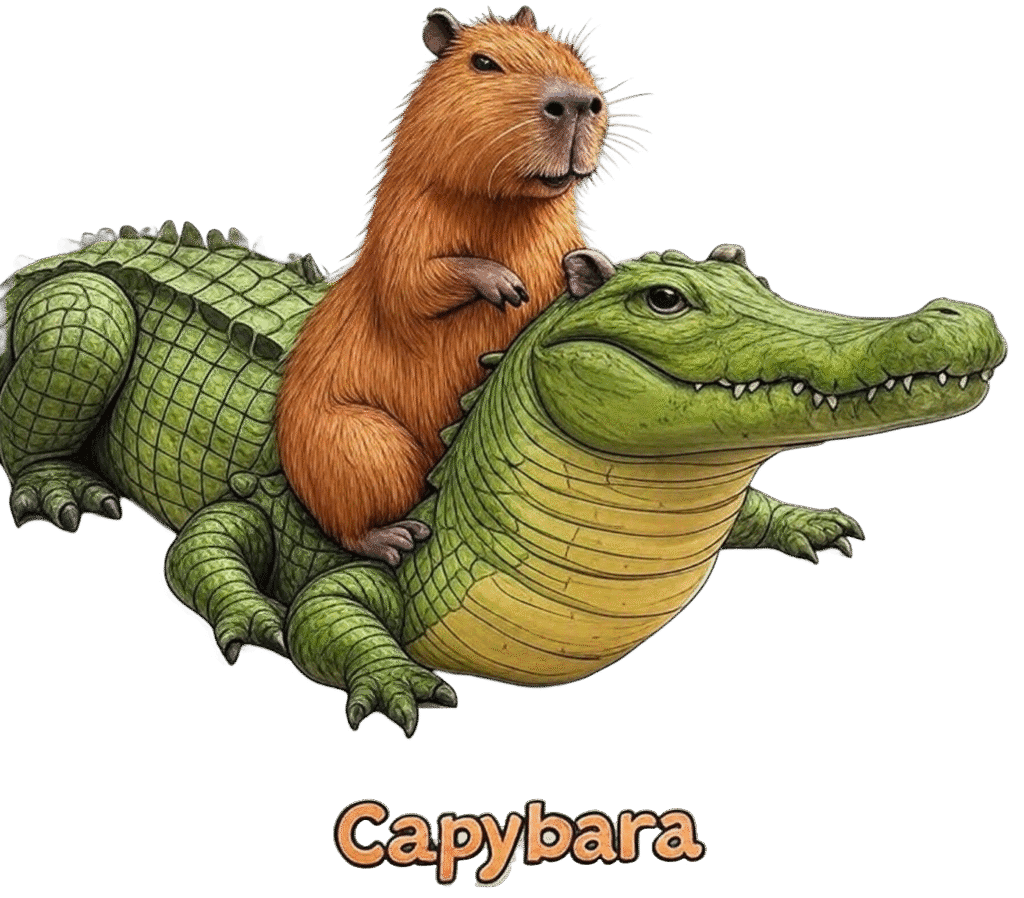The Grind Never Stops: Why Capybara Teeth Are a Survival Marvel
Updated August 10, 2025
When you look at a capybara animal, you’re often struck by its peaceful, almost zen-like expression. They seem to spend their days in a state of tranquil contentment, whether they are soaking in a hot spring or simply lounging with a bird on their head. But beneath that calm exterior lies a fascinating biological fact that keeps them on a constant, relentless grind: their teeth never stop growing.

This isn’t a quirk; it’s a vital part of their survival. As the world’s largest rodent, the capybara’s unique dental structure is the key to their success in their natural capybara habitat. In this blog post, we’ll dive into this amazing capybara fact, exploring why their teeth grow continuously, what it means for their diet and lifestyle, and why it’s one of the most important things for a potential capybara pet owner to understand.
The Science Behind the Smile: Rodent Dentistry
The continuously growing teeth of a capybara are a defining feature of all rodents. Unlike humans, whose teeth stop growing once they are fully developed, a rodent’s incisors grow throughout its entire life. The capybara’s molars also grow continuously. This is an evolutionary adaptation designed to counter the extreme wear and tear caused by their diet.
Their teeth are a specialized type known as hypsodont, which means they have high crowns and continue to erupt from the gumline. For a creature that spends its life chewing tough, fibrous plants, this constant growth is essential. Without it, their teeth would wear down completely, making it impossible for them to eat and ultimately leading to starvation.
A Capybara’s Food Is Its Toothbrush
For the capybara, a proper capybara diet isn’t just about nutrition, it’s also about dental hygiene. In their natural habitat, they spend a significant amount of time grazing on coarse grasses, aquatic plants, and tree bark. This tough, gritty vegetation acts like natural sandpaper, constantly filing down their incisors and molars. The grinding action of their jaws against this fibrous material keeps their teeth at a manageable length, preventing them from overgrowing and causing painful oral injuries.
This is why capybara funny videos often show them endlessly chewing. It might look like they are just enjoying a snack, but they are actually performing a critical, life-sustaining task. Their entire lifestyle revolves around the constant need to wear down their teeth.

The Dangers of an Improper Diet
In the wild, a capybara’s teeth rarely become a problem. But in captivity, an improper diet can lead to serious health issues. If a capybara pet is not given enough roughage, its teeth can become overgrown. Overgrown teeth can cause a host of painful problems, including:
- Difficulty Eating: The overgrown teeth can prevent them from closing their mouths properly, making it difficult to chew.
- Oral Injuries: Teeth can grow into the roof of their mouth or into their cheeks and tongue, causing painful sores and infections.
- Starvation: In severe cases, they can become unable to eat at all, leading to severe weight loss and, eventually, death.
This is a key reason why providing the correct diet of high-quality hay and fresh grass is non-negotiable for a capybara owner.
A Pet Owner’s Responsibility: From Hay to Habitat
For anyone considering a capybara as a pet, understanding the importance of dental health is paramount. It’s not just about what they eat, but also the environment you provide for them.
- Endless Hay: Always provide a constant supply of hay. This is the cornerstone of a healthy capybara diet and the primary way they manage their teeth.
- Safe Chew Toys: Offer safe, untreated wood branches (like willow or birch) for them to gnaw on. This provides both mental enrichment and a way to wear down their teeth.
- Regular Vet Checks: Find a vet who specializes in exotic animals and schedule regular checkups. An experienced vet can check for signs of dental problems and provide professional dental care if needed.
The continuously growing teeth of a capybara are a testament to the incredible design of nature. They are a constant reminder that this gentle giant, with its placid demeanor and capybara cute image, is a wild animal with unique and demanding needs. From their endless grazing in their capybara habitat to the subtle capybara noise they make, every aspect of their being is finely tuned for survival. Understanding this fundamental fact is the first step in appreciating the true complexity and resilience of the world’s largest rodent.
